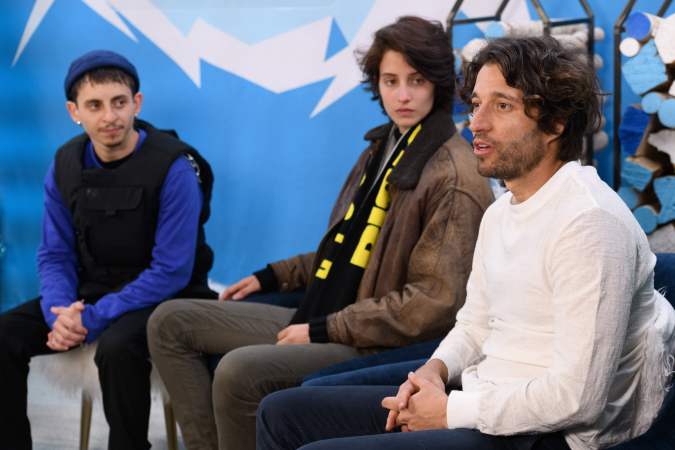Born in NYC to Colombian parents who fled their homeland due to violence, Moisés Arias’ personal history is inextricably tied to the conflict that has burdened the country for decades. Spearheading a cast of young non-professional actors in Alejandro Landes’ sensorial war flick Monos, which debuted at the 2019 Sundance Film Festival, the Colombian-American actor immersed himself wholeheartedly into the guerrilla lifestyle.
While this marked the first time Arias worked in Colombia, he had previously acted in Spanish in the short film Blast Beat by Esteban Arango. Co-starring with his brother Mateo Arias, that project dealt with a Colombian family living in the United States. “Because of that short I got in touch with Santiago [Zapata] who is the producer of this film,” Arias told Remezcla in Park City.
Upon reading the screenplay for Monos, he agreed to spend four months in Colombia for a demanding—and nearly unreasonable—cinematic undertaking. “It was described to me that it would be a very difficult experience, because we’d be up in the mountains of Chingaza near Bogota, about 14,000 feet in the air, for about a month or two, and then move into the jungles of Medellín for about four weeks.”
Former FARC guerrilla Wilson Salazar trained Arias and a group of 20 teenagers, male and female, for several weeks before prior to shooting. The exercise routine and value system on screen matches what Salazar imparted during this process. Out of those finalists, eight were eventually hired to complete the Monos squad, all of which bear humorously descriptive monikers: Rambo, Lobo, Leidi, Sueca, Pitufo, Perro, Boom Boom, and Patagrande (Arias).


“[It was] the coldest I’ve ever been, and the warmest I’ve even been,” explained Arias about the overall production. “We weren’t eating properly, we weren’t sleeping properly, we were trained as if we were guerilla kids, and that’s why the film came out the way it did.” Arias referred to the authenticity obtained as “documentative,” alluding to the near-documentary origination of the film. “Everything that’s in the film is us being thrown into the situations, rather than the situations being created around us.”
To further align with his siblings in arms, who weren’t given access to the script, Arias chose not to speak English for the entire duration of the shoot. Even though he is fluent in Spanish, he notes, there were moments of improvisations in which the first-time actors would use words that were foreign to him. “They have a “jerga” or lingo that’s too difficult to be on par with. There were definitely times where I was like, ‘Yo, what the F does that mean?’” Fortunately, being around them indirectly helped him assimilate to their jargon.
For Arias, whose career has evolved from his days in Disney sitcoms, having a Spanish-language part in a Latin American movie means his extended family in Colombia will have the opportunity to see him perform in their native tongue. “It’ll be the first time that they understand the film instead of reading the subtitles or watching something dubbed, so I think it’s going to be special,” the actor noted.
Landes’ third feature (following Cocalero and Porfirio) follows the juvenile fighters as they care for a hostage, Doctora Sara Watson (American actress Julianne Nicholson), and establish their self-regulated power structure.
As Patagrande, the de facto leader of the pack, Arias plays a fundamental role in how the operation is executed. “Just with his name we know he is a heavy-footed individual, even being the small person that I am,” he noted. “When there’s an opportunity to take a commanding position, he does, and the movie, as it unfolds, shows what power does to a person.”
Given the political context of Monos and the ongoing campaign for lasting peace in Colombia, Arias was concerned regarding how the story would be received, thus he attended the first public screening dressed for confrontation. “I was definitely worried. I wore a mock bulletproof vest to the premiere. Mock, because I was prepared for very harsh questioning,” he frankly explained. Luckily there was no need to be guarded, at least for now, as the initial reception was highly positive.
When asked if he believed Landes’ visceral and ravishingly photographed thriller concludes on a hopeful note, he stated, “I’d like to think so. It’s beautiful that it ends with eye contact.” Visually acknowledging the other’s suffering, even if not seeing eye-to-eye, is a valuable step in the long route towards reconciliation.




